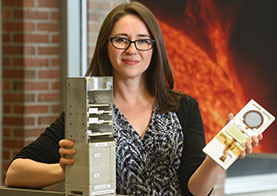Energization, Loss, and Variability of Electrons and Protons in
Earth's Radiation Belts: Observations, Physical Processes, and
Measurement Techniques
Ashley Greeley
PhD Candidate
Department of Physics
The Catholic University of America
Wed, October 9, 2019 - 4:00 PM
Karl Herzfeld Auditorium of Hannan Hall - Rm 108

Since their discovery in 1958, the Earth's radiation belts have been studied extensively using a variety of measurement techniques. However, there are many questions left outstanding in the field of radiation belt physics. We present here three studies across energization, loss, and variability of charged particles in the radiation belts. First, we focus on loss mechanisms, particularly electron loss through relativistic microbursts. This study addresses the connection between microburst loss and longer-term flux decay.
Then, we quantify the evolution of pitch angle distributions between
relativistic and ultra relativistic electrons measured by the Van Allen probes during events when electrons are enhanced, determining if enhancement events show a coherence in pitch angle distribution changes during the recovery phase of geomagnetic storms. These studies look at electron loss and acceleration in the outer radiation belts in new ways, helping to understand the delicate balance of mechanisms
that affect these populations. We also study protons in the inner belt, tracking the secular drift of the South Atlantic Anomaly over nearly two solar cycles and compare it to the IGRF12 model. The research contributes to the long-term characterization of the geomagnetic field, extending the understanding of the SAA movement through long-term, single-spacecraft measurements. These studies contribute to a greater understanding of the behavior of charged particles in geomagnetic fields, microbursts, and wave-particle interactions in the radiation belts. Lastly, we outline the design and build of a new CubeSat mission that can be used to observe the charged particle populations in great detail.
Refreshments served at 3:45 PM
If you have any questions about the Colloquium Series or would like to make a donation please contact the Physics Department, cua-physics@cua.edu or (202) 319-5315.
